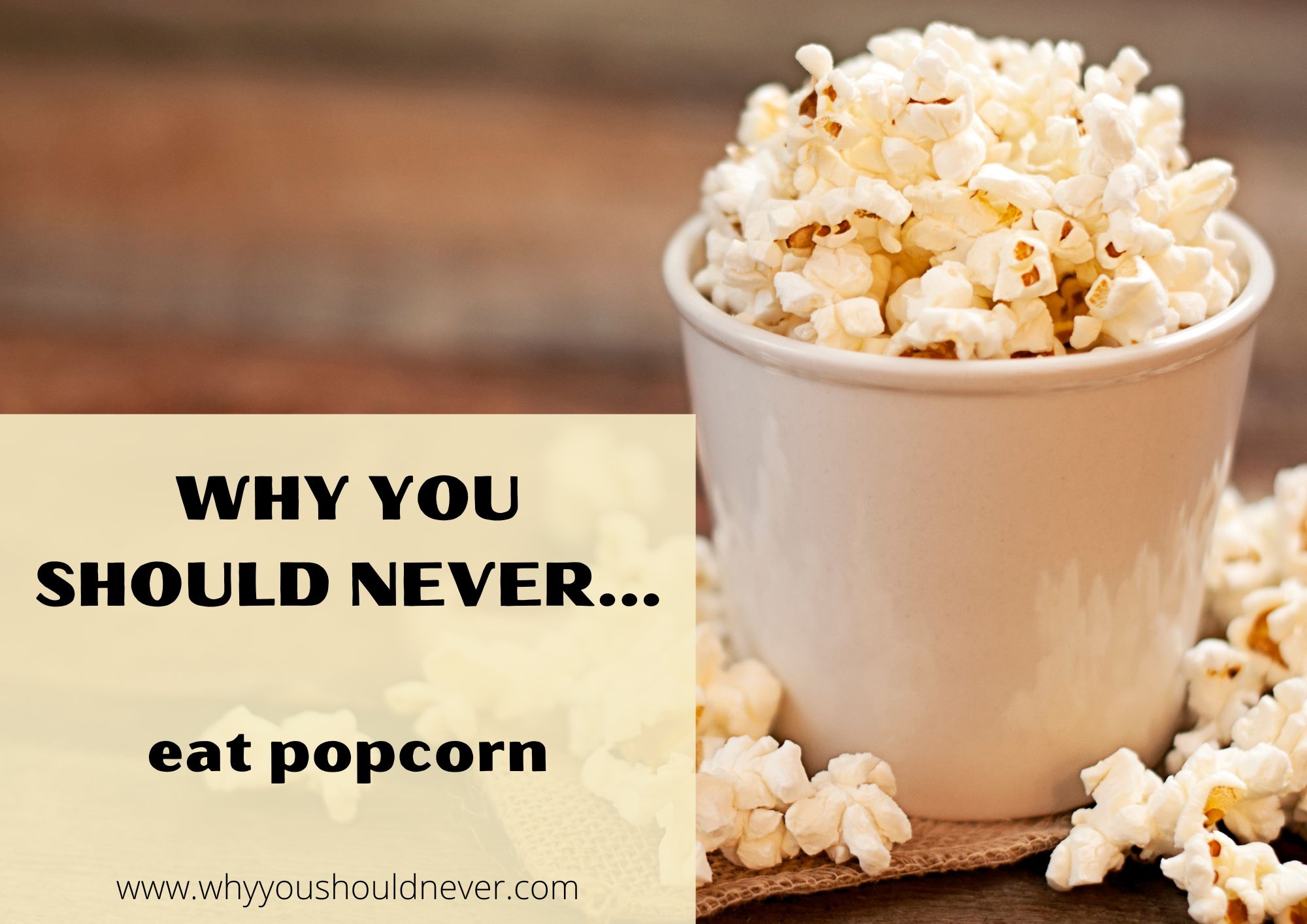![]()
Why You Should Never Eat Popcorn
Popcorn! The snack of movie theaters, cozy nights at home, and sporting events. With its warm, fluffy kernels and the satisfying crunch it offers, popcorn has charmed its way into many of our lives.
It’s versatile too! Dress it up with some melted butter and a sprinkle of salt, or go gourmet with spices, cheese, and more. People love it for its convenience, affordability, and most importantly, its taste.
And compared to most other snacks – like potato chips, chocolate, or cookies – popcorn (in its plain form, that is) might even seem like a healthier option. After all, it’s just popped corn kernels, right? And corn is a vegetable! Plus, popcorn is a whole grain and high in fiber, making it a choice that some consider a little bit on the healthier side.
But, sadly, as with everything delicious in life, popcorn isn’t perfect. Yes, it has its good points, but it also comes with a set of drawbacks that might make you pause before you dig into that next big bowl…
14 reasons why you shouldn’t eat popcorn
1. High in calories
Although popcorn seems light and fluffy, those calories can add up quickly, especially when you add butter or sugar.
If you’re on a diet or counting calories, consuming a large bucket of popcorn (particularly the kind that has a whole bunch of calorie-dense toppings) could set you back quite a bit, making it difficult to achieve your weight loss goals.
50g of plain popcorn contains around 200 calories, which, granted, is pretty low for the amount you get. But once you add in butter, or go for caramel or cheese flavors, you could easily double or even triple that number.
And let’s be honest, most of us don’t stop at just 50g, especially during a thrilling movie or an exciting game.
2. Unhealthy additives
Prepackaged and microwave popcorn often contain artificial flavors, preservatives, and other chemicals. These additives can have negative health impacts over time, and they move popcorn from the “natural snack” category into the “processed food” one.
3. Choking hazard
Popcorn is a common choking hazard, especially for children. The small, hard kernels can easily get lodged in the throat. Because of this, many schools and health organizations recommend against giving popcorn to young children.
4. Tooth damage
Unpopped kernels can be very hard and biting into them could damage your teeth. They can also get stuck between your teeth or in your gums, causing discomfort and potentially leading to dental issues like cavities or gum infections.
5. High sodium
A sprinkle of salt may make popcorn tastier, but it also increases its sodium content. High sodium intake is linked to high blood pressure and other cardiovascular problems. Consistently consuming high-sodium foods like popcorn could negatively affect your heart health.
6. GMO concerns
Much of the corn used for popcorn is genetically modified. While the health effects of GMOs are still under debate, some people prefer to avoid them altogether. Non-GMO popcorn options are available but are often more expensive.
7. Digestive issues
While popcorn is a good source of fiber, consuming it in large quantities could lead to digestive issues such as bloating and gas. This is particularly true if you’re not used to a high-fiber diet, making your movie night less enjoyable.
8. Processed oils
Many types of popcorn, particularly those that are prepackaged, use oils high in saturated or trans fats. These types of fats can raise your bad cholesterol levels, increasing the risk of heart disease.
9. Allergy risk
If you’re allergic to corn, popcorn is obviously not a safe snack for you. Corn allergies are relatively rare but serious, and symptoms can include hives, vomiting, or even anaphylaxis.
10. Risk of burns
Making popcorn at home, especially in hot oil or in the microwave, poses a burn risk. Hot oil can splatter, and steam can burst out when you open a microwave popcorn bag, potentially causing burns.
11. Not nutrient-dense
Despite its deliciousness, popcorn doesn’t offer much in the way of essential nutrients like vitamins and minerals. If you’re looking for a snack that’s nutritious as well as tasty, you might want to explore other options.
12. High in acrylamide
Popcorn contains acrylamide, a chemical formed when cooking starchy foods at high temperatures. Some studies suggest acrylamide may be linked to cancer, although more research is needed to confirm this.
13. Popcorn is mostly just carbs
If you’re following a low-carb or ketogenic diet, popcorn is a poor choice (and that’s an understatement!). It’s rich in carbohydrates, which can throw off your dietary balance and make it difficult to maintain a state of ketosis, if that’s your goal.
14. Eaten at the worst time of the day
We generally tend to eat popcorn at the end of the day, once we’ve settled in for a movie night or some late-night TV.
Eating popcorn late in the evening means that those extra calories and carbohydrates won’t be burned off through activity, like they might be if consumed earlier in the day. This can contribute to weight gain over time, especially if those late-night popcorn sessions become a regular habit.
Final thoughts
I know what you’re thinking — “Can’t a person enjoy a simple bowl of popcorn anymore?”
Of course you can! But like with anything in life, it’s good to have all the information before making a decision. Knowing the ups and downs of this popular snack can help you enjoy it in a way that fits your lifestyle and health goals.
If you’re still a popcorn enthusiast after reading about its cons, that’s totally okay! There are plenty of ways to make your popcorn experience healthier. Air-popped popcorn without added butter or salt is a good alternative. You can also try seasoning it with herbs or nutritional yeast for flavor without the extra calories or sodium.
So go ahead, pop that corn! Just maybe not the whole bag, all right?




